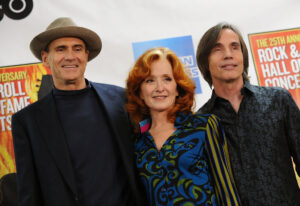
David Rensin | Crawdaddy!, March 1973
LOS ANGELES – Bonnie Raitt is by nature a purposeful woman. On a personal level, she is attempting to forge a new ethic reaching beyond the often selfimposed limitations of today’s recording/performing artists. Bonnie is warm and disarming – she smiles, you smile. Yet at 22, she is already aware of both the advantages and consequences of her chosen way of life.
“When I started out I didn’t even want to make a record,” Bonnie said as we settled into a sofa. “I didn’t take it seriously then and in a way, I don’t now. But I had to put out a record to survive, to keep things going. Right now I’d be content to be just well known enough to go on playing the Ash Grove circuit for the next 20 years.”
A sense of social responsibility and political consciousness nurtured at an early age makes Bonnie see life as a series of compromises, but she feels everyone should be able to answer for whatever he/she does at any time. This viewpoint makes abundantly clear the reasons she chose to sign with Warner Bros. instead of, say, Arhoolie Records. “Warner Bros. gives me a total budget (instead of advances) that I put into one account and decide what to do with,” Bonnie explained. “So I’m carrying off some innovative ventures in accordance with my belief that artists should take only what they need to live on from performance, record and royalty money and find ways to redistribute or give back the rest. Everybody’s just out to take all the money they can and I’m just trying to do something different.”
For example: Using the record company money given her to do the first album, Bonnie decided to take a chance on a friend who was in the process of setting up his own studio and needed some money to get off the ground. She provided the cash and although he had only four-track equipment, recorded with him. “My first album was done in a garage in Minneapolis, but I wasn’t trying for the perfect record. Some of the money I had went to musicians who had never played a session before, but they were friends who needed the cash to go on doing the kind of music they wanted to. Besides the guy with the studio, Dave Ray, now puts out records for $2.00-$2.50 and each contains a complete accounting of how every penny is spent. I really believe in that sort of thing.
“My main motivations are political in a different sort of way. To me politics is relating to and caring about people. I just want to have a good time and give the audience something worthwhile. My primary interest is in how I’m playing things and I don’t care if I sing good or bad, play up to par or write the most original songs. That’s irrelevant.”
Onstage, Bonnie and her bass player, Freebo, who looms quietly but effectively behind her, are at home with almost any audience. Her choice of music ranges from old blues to originals to songs by friends and peers Joni Mitchell, Jackson Browne, Chris Smither and Joel Zoss, to ’60s standards such as ‘I Know’ (Barbara George), ‘Walk on By’, ‘Since I Fell For You’ and Stephen Stills’ ‘Bluebird’. Bonnie’s vocals are clear and strong, with just the right amount of feeling. Above all, they are fresh and honest.
The daughter of musical-comedy star John Raitt (Carousel, The Pajama Game), Bonnie was born in Burbank, but found herself shuttled across the country a number of times before finally settling in Los Angeles (for a while) in 1957. “I hated Los Angeles,” she recalled. But her parents’ reluctance to dive headlong into the blossoming Hollywood/Beverly Hills social scene saved Bonnie the experience of growing up with the sons and daughters of her parents’ show business acquaintances. Instead, she divided her time between school, records, guitar and a Shaker Village Quaker-oriented camp in the summer.
“It was the camp that put me in a social situation with leftist-type people,” said Bonnie, brushing a thick lock of hair away from her abundantly freckled face. “I was around activities that had no basis in my Los Angeles world or the schools I went to – you know, Pete Seeger, Joan Baez, SNCC, pacifism and all that. I went for eight years and managed to absorb most of my political values from that atmosphere.”
Growing up in Los Angeles, Bonnie nevertheless never took to surf, folk or white rock music, and she still dislikes being cast as any particular type of singer. For her it was soul music, dancing, drinking, partying and opposition in general to the beach fads of her time. But her interests weren’t limited only to youthful machinations, because at 13 she was already listening to Son House, John Hammond, and Jon Hurt – mostly because she liked them, and partially as a result of her rebellious nature.
Moving East into the alternative culture of progressive schools, Bonnie finished her mandatory education and then attended college for a while (Radcliffe, no less). She also hung out at Boston’s Club 47 during its last year, as well as other clubs, long enough to realize she could sing better than a lot of the second acts that were being booked. “I was sick of working in the daytime and I needed money to live, so I gave it a try.” As Bonnie began to circulate, her reputation preceded her and the gigs eventually led to the Gaslight in New York and the Main Point in Philadelphia as well as that city’s Folk Festival. A record contract soon followed and she currently has two solid releases on Warner Bros., Bonnie Raitt and Give It Up.
Bonnie spoke about the problems she faces as a woman on the road: “Some things make it difficult for me to adjust. For instance, if I were to meet a guy I liked, I couldn’t just drag him along with me the way a guy can take a chick. It would be a strange, masculine situation for me although it’s already something I have to a degree since I write out all the checks for my bass player and studio musicians. I’m a strong person and a strong girl and I’ve never been oppressed even though I’m not the overly ‘feminine’ type.” As a child, Bonnie said, “I did anything I wanted to, and now that I’m grown up I meet all these girls who say that they’re ‘so proud of me because I’m so good on the guitar and I’m doing my own thing…’ it just flips me out. I never realized that other girls were more conditioned not to do what they wanted in certain areas. I just don’t like the idea of being put on a pedestal.” But being one of the few young, proficient and well-known woman guitarists (and she plays a mean bottleneck), Bonnie finds herself beginning to have a deal with a worship situation by a good part of the press, public and music business.
“All I’m trying to do is revolutionize the business in my own way. I’m just doing it in the most righteous way possible – not screwing or ripping anybody off. If I happen to get famous because of what I’m trying to accomplish, fine, but on a personal level it scares me. I’d rather be just as I am since I’m starting to lose my privacy. I even have to go out of my way to have a good time.”.
Bonnie, above all, considers herself a fluke because although she’s so political, she’s still in demand. According to her, most of the revolutionary folk/blues artists are never heard of since they refuse to go commercial or because they all write and sing like a “shitty Dylan.” “But my politics,” Bonnie explained, “is how I deal with everyone as a person, not which organization I belong to or write checks out for. It’s how I deal with the people on the street and myself. It’s putting old blues musicians on my bill because they need the work. Big blues stars have a right to play their music like anybody else, but they don’t have the right to take so much money when other blues musicians are starving. Having them with me is educational, it shows audiences the real thing still exists.”
Eventually, Bonnie plans to charge only one or two dollars for her shows and intends to put street theater and political films on the bill as well. All this fits in with her desire to refrain from becoming a star. “Star is such a piggy position to be in, though I don’t mind if people know about me – that’s a completely different situation. Most artists will take any money that’s offered to them and buy big houses or fancy cars and never worry about keeping ticket prices or their own fees down. I’m getting to the point now in the East where I draw enough to have a say in the door prices. When I have leftover money, I usually add another piece to my band.”
Even with a number of well-known friends in the business, Bonnie doesn’t often get a chance to talk with them about following her lead. She claims it’s because they see each other so rarely, but it seems she avoids pressuring them, because it’s really only her personal burden. Though Bonnie says she understands other artists’ lack of social/political responsibility, she doesn’t forgive it. “Still, I guess some of them don’t have the energy to worry about all the things that concern me – they leave it all up to their agency.” Bonnie refuses to have an agency, performing their functions herself. “Luckily,” she says, “I’m still strong enough at this time, I may not be later. The public expects you to play a role and often literally kill yourself for them. So it’s either destroy yourself or withdraw. I was raised with a political outlook to know better, but people like Dylan and James Taylor just withdrew. I’m not planning to let it happen to me, and I guess that sets me apart.”
© David Rensin, 1973













 Visitors Today : 133
Visitors Today : 133 Now Online : 1
Now Online : 1















































































































